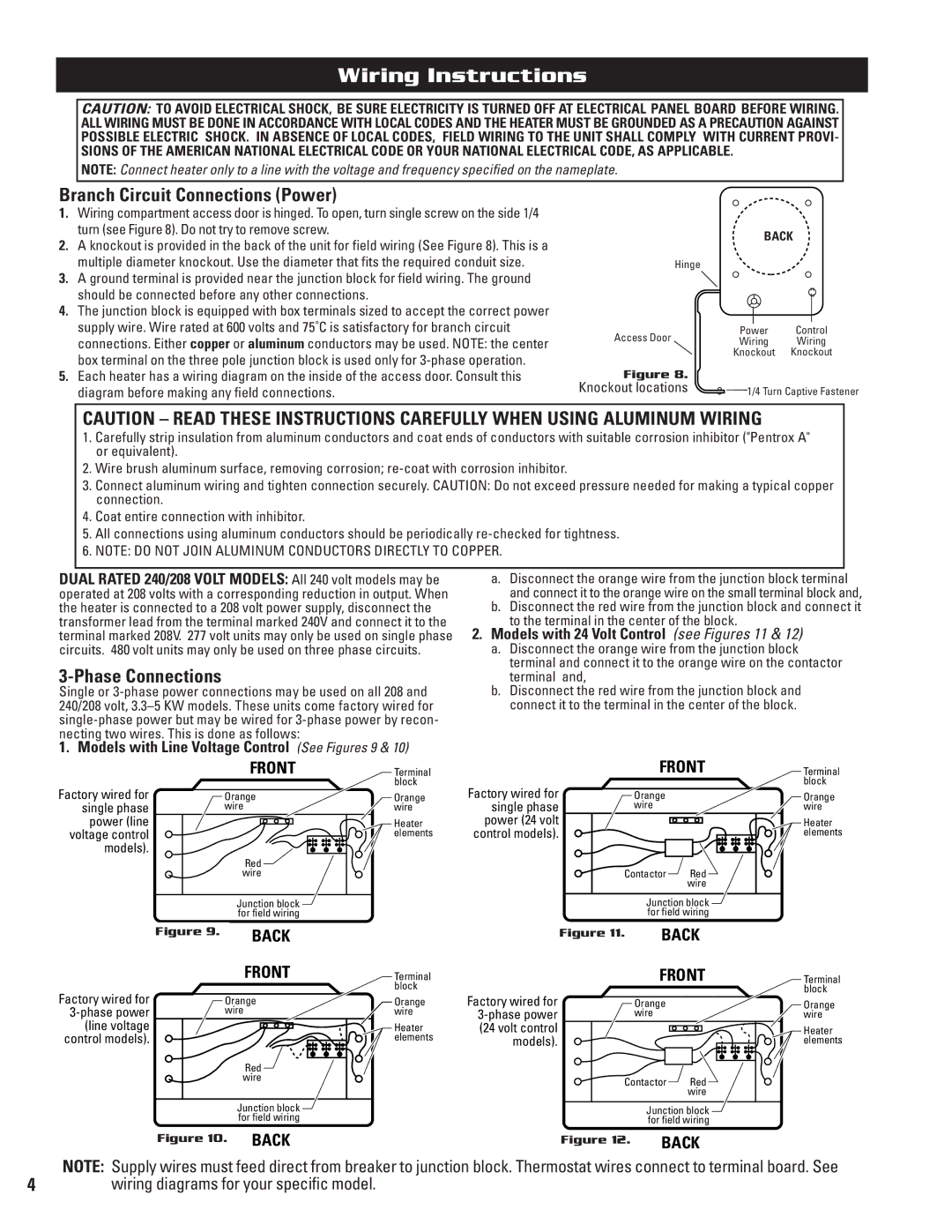
Wiring Instructions
CAUTION: TO AVOID ELECTRICAL SHOCK, BE SURE ELECTRICITY IS TURNED OFF AT ELECTRICAL PANEL BOARD BEFORE WIRING. ALL WIRING MUST BE DONE IN ACCORDANCE WITH LOCAL CODES AND THE HEATER MUST BE GROUNDED AS A PRECAUTION AGAINST POSSIBLE ELECTRIC SHOCK. IN ABSENCE OF LOCAL CODES, FIELD WIRING TO THE UNIT SHALL COMPLY WITH CURRENT PROVI- SIONS OF THE AMERICAN NATIONAL ELECTRICAL CODE OR YOUR NATIONAL ELECTRICAL CODE, AS APPLICABLE.
NOTE: Connect heater only to a line with the voltage and frequency specified on the nameplate.
Branch Circuit Connections (Power)
1.Wiring compartment access door is hinged. To open, turn single screw on the side 1/4 turn (see Figure 8). Do not try to remove screw.
2.A knockout is provided in the back of the unit for field wiring (See Figure 8). This is a multiple diameter knockout. Use the diameter that fits the required conduit size.
3.A ground terminal is provided near the junction block for field wiring. The ground should be connected before any other connections.
4.The junction block is equipped with box terminals sized to accept the correct power supply wire. Wire rated at 600 volts and 75˚C is satisfactory for branch circuit connections. Either copper or aluminum conductors may be used. NOTE: the center box terminal on the three pole junction block is used only for
5.Each heater has a wiring diagram on the inside of the access door. Consult this diagram before making any field connections.
BACK
Hinge
Power Control
Access DoorWiring Wiring
Knockout Knockout
Figure 8.
Knockout locations | 1/4 Turn Captive Fastener |
CAUTION – READ THESE INSTRUCTIONS CAREFULLY WHEN USING ALUMINUM WIRING
1.Carefully strip insulation from aluminum conductors and coat ends of conductors with suitable corrosion inhibitor ("Pentrox A" or equivalent).
2.Wire brush aluminum surface, removing corrosion;
3.Connect aluminum wiring and tighten connection securely. CAUTION: Do not exceed pressure needed for making a typical copper connection.
4.Coat entire connection with inhibitor.
5.All connections using aluminum conductors should be periodically
6.NOTE: DO NOT JOIN ALUMINUM CONDUCTORS DIRECTLY TO COPPER.
DUAL RATED 240/208 VOLT MODELS: All 240 volt models may be operated at 208 volts with a corresponding reduction in output. When the heater is connected to a 208 volt power supply, disconnect the transformer lead from the terminal marked 240V and connect it to the terminal marked 208V. 277 volt units may only be used on single phase circuits. 480 volt units may only be used on three phase circuits.
3-Phase Connections
Single or
1. Models with Line Voltage Control (See Figures 9 & 10)
a.Disconnect the orange wire from the junction block terminal and connect it to the orange wire on the small terminal block and,
b.Disconnect the red wire from the junction block and connect it to the terminal in the center of the block.
2.Models with 24 Volt Control (see Figures 11 & 12)
a.Disconnect the orange wire from the junction block terminal and connect it to the orange wire on the contactor terminal and,
b.Disconnect the red wire from the junction block and connect it to the terminal in the center of the block.
Factory wired for single phase power (line voltage control models).
FRONT
Orange wire
Red ![]() wire
wire
Junction block for field wiring
Terminal block
Orange wire
Heater elements
Factory wired for
power(line voltage(24 controll models))..
FRONT
Orange wire
Red ![]()
Contactorwire Red
wire
Junction block forr fieldld wiiring
Terminal block
Orange wire
Heaterr elements
Figure 9. BACK
Figure 11. BACK
Factoryry wired forr
FRONT
Orange Orange wire wire
Red  wire
wire
Contactor Red wire
Junction block Junction block for field wiring for field wiring
Terminal Terminal block block
Orange Orange wire wire
Heater
Heater elements elements
Factory wired for
FRONT
Orange wire
Contactor![]() Red wire
Red wire
Junction block for field wiring
Terminal block
Orange wire
Heater elements
Figure 10. BACK
Figure 12. BACK
| NOTE: Supply wires must feed direct from breaker to junction block. Thermostat wires connect to terminal board. See |
4 | wiring diagrams for your specific model. |
